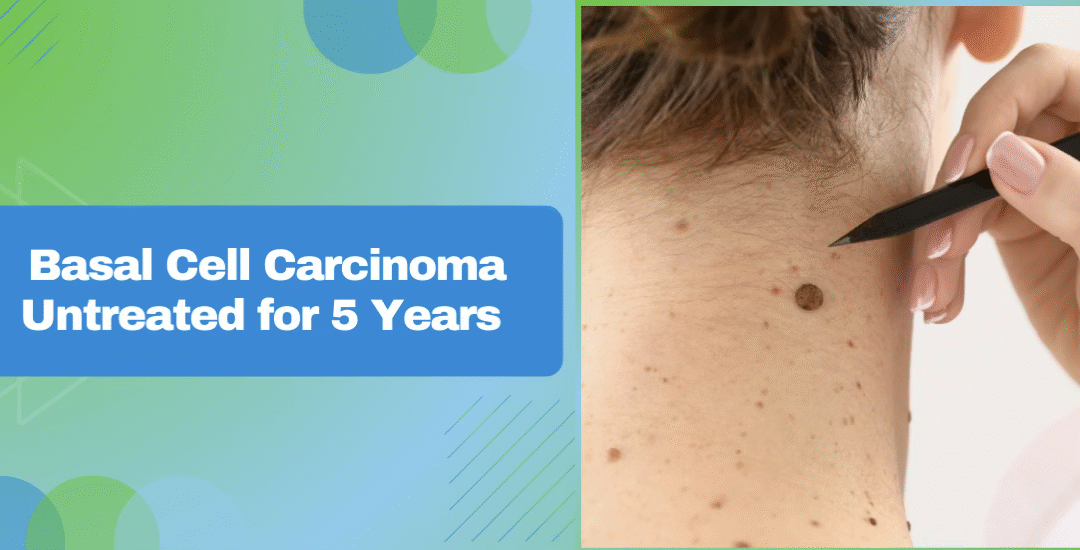Hearing the word cancer can instantly stir fear and uncertainty. It’s natural—cancer has long been associated with life-altering changes. Among the various forms, basal cell carcinoma (BCC) is the most common type of skin cancer. While it grows more slowly than many other cancers, leaving it untreated for years can still have serious consequences.
Globally, over 3.6 million new cases of basal cell carcinoma are diagnosed every year, making it the most frequent skin cancer worldwide. In India, with rising sun exposure, changing lifestyles, and limited awareness, the numbers are steadily climbing, though many cases still go undiagnosed or ignored until late.
BCC begins in the basal cells of the skin, which are responsible for creating new skin tissue as old cells shed. The condition often appears as a small, shiny bump or persistent sore that doesn’t heal. While it rarely spreads to distant organs, untreated cases can invade deeper tissues, causing disfigurement and significant functional problems.
Dr. Leena Jain, an acclaimed Plastic surgeon in Mumbai, says:
“Patients sometimes underestimate basal cell carcinoma because it doesn’t seem aggressive at first. But any cancer that grows unchecked for years can erode tissues, damage structures beneath the skin, and drastically alter quality of life. My approach is always to educate patients early so they can make informed choices before complications set in.”
What Happens if BCC Is Left Untreated for 5 Years?
Leaving basal cell carcinoma untreated for five years can allow the tumor to grow slowly but steadily. Unlike other fast-spreading cancers, BCC tends to invade locally, meaning it burrows deeper rather than traveling to distant organs. However, that slow growth shouldn’t be mistaken for harmlessness.

Over time, the following changes are often seen:
Larger Lesions: What begins as a small nodule can turn into a noticeable sore or patch.
Tissue Destruction: BCC can destroy surrounding skin, fat, and even muscle or bone underneath.
Persistent Ulceration: Many patients develop wounds that do not heal, leading to pain and infections.
Functional Impairment: If near the eye, nose, or mouth, it may interfere with vision, breathing, or eating.
Cosmetic Disfigurement: Advanced lesions can cause visible deformities, affecting self-image.
Dr. Leena Jain, a vigilant reconstructive surgeon in Mumbai, notes:
“Five years is a long time for basal cell carcinoma to silently progress. What may seem like a slow change on the surface could mean deep invasion beneath. I’ve seen patients regret delaying treatment because early intervention would have saved them from complex surgeries.”
Treatment Options Available for Basal Cell Carcinoma

The good news is that basal cell carcinoma is highly treatable, especially when caught early. Different treatment approaches are available depending on the size, depth, and location of the cancer.
Here are the main options:
Surgical Excision: Removing the tumor with a margin of healthy skin ensures complete clearance.
Mohs Surgery: A precise method where layers are removed and examined until no cancer remains, ideal for sensitive areas like the face.
Curettage and Electrodessication: Scraping away the lesion followed by cauterization.
Radiation Therapy: Used when surgery isn’t possible, particularly for older patients.
Topical Medications: Creams for very superficial cancers.
Targeted Therapy: For rare advanced cases not suitable for surgery.
Dr. Leena Jain, a skilled reconstructive oncologic surgeon in Mumbai, explains:
“The beauty of treating BCC lies in the options—whether minimally invasive or more extensive, treatments today are effective and safe. The key is tailoring the approach to the patient’s needs while preserving both function and appearance.”
Potential Complications of Delayed Treatment
When treatment is delayed, BCC doesn’t remain harmless. Its local spread can cause both medical and emotional challenges.

Some of the major complications include:
Tissue Damage: Invasion into skin, cartilage, or bone.
Loss of Function: Affecting eyes, nose, or mouth if nearby structures are involved.
Reconstructive Challenges: Larger cancers need more complex surgeries, sometimes requiring grafts or flaps.
Higher Recurrence Rates: Incomplete treatment becomes more likely with larger, deeper cancers.
Emotional Strain: Deformity or long-term wound care can lower confidence and social comfort.
Dr. Leena Jain, a forward-thinking facial reconstruction expert in Mumbai, shares:
“Every delay allows basal cell carcinoma to grow stronger roots. At advanced stages, surgeries become more complex, healing takes longer, and emotional distress is higher. Addressing it early is always less invasive and far more reassuring for the patient.”
Importance of Early Diagnosis and Intervention
Catching basal cell carcinoma at its earliest stage often means simpler treatment, faster recovery, and minimal scarring. Awareness and vigilance can make the difference between a small outpatient procedure and a major reconstructive surgery.
Why early action matters:
Less Invasive: Small tumors can be removed with minimal tissue loss.
Better Cosmetic Results: Smaller scars and preserved facial harmony.
Faster Recovery: Healing is smoother when the cancer is caught early.
Lower Costs: Treatment is less expensive in early stages.
Peace of Mind: Early diagnosis reduces anxiety and uncertainty.
Dr. Leena Jain, a preventive-focused Plastic surgeon in Mumbai, advises:
“The earlier we diagnose basal cell carcinoma, the more straightforward the treatment becomes. Patients often appreciate not just the medical benefit but also the reassurance that comes from knowing the cancer was addressed before it caused deeper harm.”
Conclusion
Basal cell carcinoma may not behave like the aggressive cancers we often hear about, but leaving it unchecked—especially for years—can be life-changing in its own way. Dealing with BCC may feel daunting, but the truth is: with early diagnosis and proper treatment, it is one of the most curable cancers.
Timely action can save you from painful treatments, complicated surgeries, and emotional stress. The choice to act today can save you years of stress and complex treatment later.
FAQs
1. Is basal cell carcinoma life-threatening if untreated for 5 years?
2. Can BCC go away on its own?
3. How can I tell if my skin spot is BCC?
4. Will surgery for BCC leave a scar?
5. Can basal cell carcinoma return after treatment?
References:
https://www.mayoclinic.org/diseases-conditions/basal-cell-carcinoma/symptoms-causes/syc-20354187
https://www.skincancer.org/skin-cancer-information/basal-cell-carcinoma/
Disclaimer: The information shared in this content is for educational purposes only and not for promotional use.

